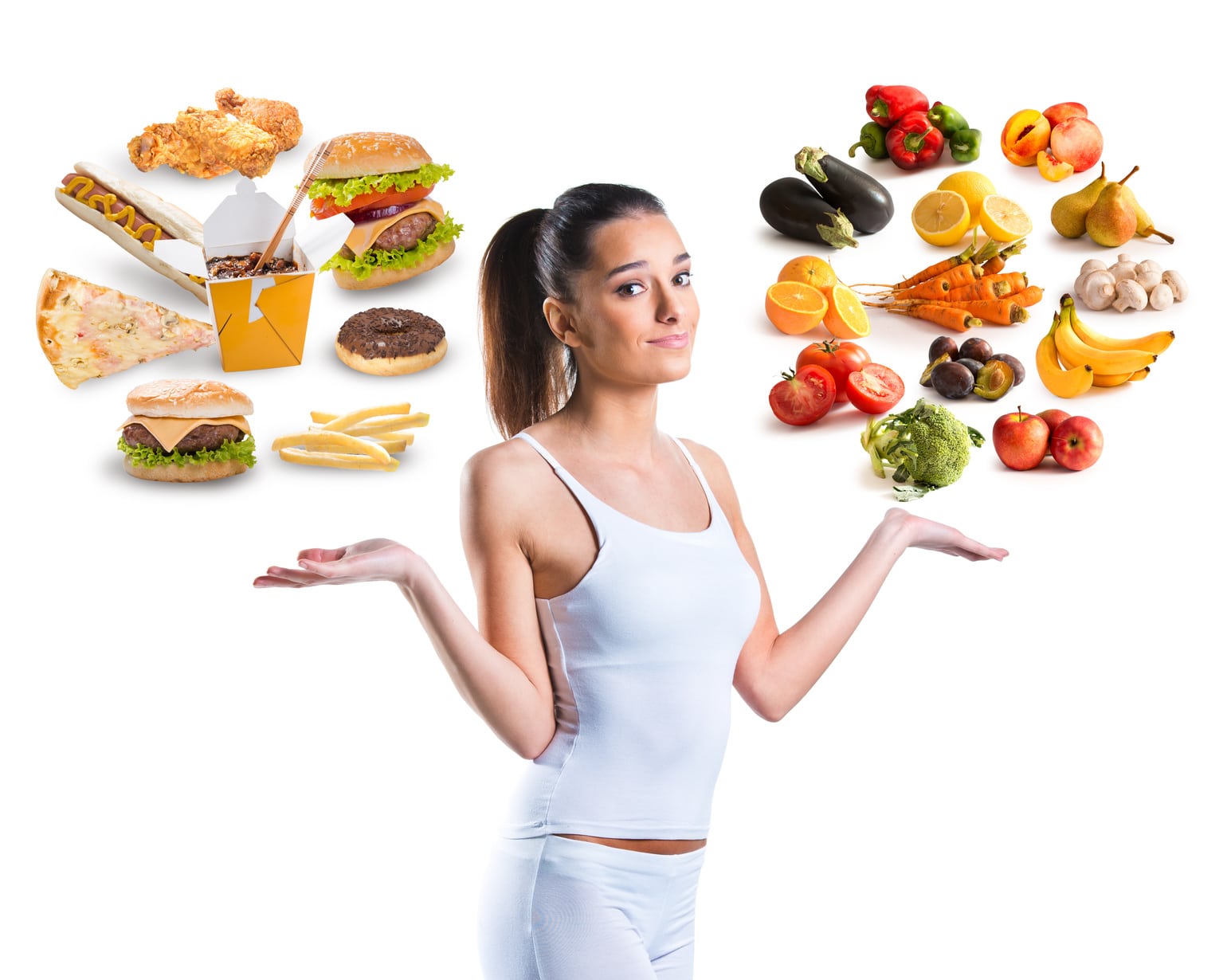Whether you are a runner, a biker, a Crossfitter, or just a fitness enthusiast, the quality of the foods you consume has a huge impact on your fitness gains and results.
And as you might already know, there are mainly two categories of foods: natural foods and processed foods.
So what’s the difference between these two?
Which one is better for you?
Why?
Which one (s) should you avoid?
These are some of the questions I will give a clear and jargon-free answer to.
In today’s post, I will dive a little deeper into what makes (and defines) natural foods versus processed foods as there some to still be many misunderstandings regarding this topic.
So are you excited?
Then here we go…
Natural Foods
For most people, hearing the words “natural foods” conjures up pictures of health stores and strict vegan lifestyle choices.
But, in essence, the term refers to any food that has undergone minimal processing, whose ingredients come from natural sources, and contains little or no artificial additive or preservatives before consumption.
And by far, consuming a natural food rich diet is the healthiest and best nutrition decision you can ever make.
Why Natural Foods are Better?
Consuming whole and unprocessed foods, such as vegetables, fruits, meats, whole grains, and non-homogenized dairy products, has immense health benefits as they’re rich in nutrients and contain fewer additives than heavily processed foods.
For instance, whole-wheat based bread is healthier than bread made from white flour, potatoes are more nutritious than potato chips, and oranges cannot be held on the same pedestal as orange juices sold in convenience stores.
Natural foods score high in vitamins, minerals, amino acids, (the good) carbohydrates, water, fiber, fatty acids, and much more.
These are all essential to optimal human nutrition.
Natural foods can help regulate blood sugar levels, reduce cholesterol, cut the risks of cardiovascular disease, prevent diabetes, speed up weight loss, and help you get into the best physical and mental shape of your life.
The full list benefits go beyond this article’s scope, but I think you are getting the big picture.
The Foods to Eat
Here are some of the natural food components you need to consume for more bang for your buck.
- Fresh vegetables and fruits, such as kale, asparagus, cabbage, broccoli, spinach, Brussels sprouts, cherries, pears, berries, apples, and plums.
- Lean sources of meat, free-range chicken, wild fish, and grass fed beef, fresh fish/shellfish, eggs, etc.
- Omega-3 foods: eggs, sardines, wild salmon, herring.
- Whole grains, mainly quinoa, amaranth, barley, whole grain rye, buckwheat, millet, and Kasha.
- Beans and legumes, especially lentils, and chickpeas.
- Nuts, such as walnuts, almonds, macadamia nuts, pistachios, and pecans.
- Seeds, such as flax, Chia, sunflower and pumpkin
Processed Foods
Processed food stands for any food that has been purposefully altered in a “food lab” in some way or the other before consumption.
This is done for four main purposes: (1) to postpone spoilage, (2) to make our lifestyle easier, (3) to increase food lifespan, and most importantly, (4) to make more money for the food manufacturer—which is the driving force in most cases.
As a rule of thumb, processed foods have more than one ingredient.
Food companies usually rely on artificial sugars, dyes, preservatives, bad fats such trans and saturated fats, and other harmful dietary chemicals in the everyday production of processed foods.
Processed foods might include food that has been canned, cooked, packaged, soaked, frozen, or changed in nutritional structure, whether it’s through preserving, fortifying, fermenting or preparing in different ways.
So, any time you bake, cook or prepare food, the term processed can be applied.
Examples of processed foods include processed meats, snack chips, cake mixes, candy, bread, sodas, savory snacks, such as crisps, frozen dinners, convenience foods, such ready meals or microwaved meals.
Other foods include a muffin, soda, Boca burgers, donuts, pizza, almost every at McDonald, Burger King, and the rest of fast food in restaurants, etc.
So, they are not just microwaved meals and boxed macaroni, and drive-thru snacks.
Additional resource – Vitamin D for runners
I see Processed Foods Everywhere
Here is the thing.
Processed foods are everywhere.
They’ve invaded our kitchen and, apparently, for most people, they are there to stay.
Get this: according to my estimation, 9 out 10 of the foods you can buy at a shop will be processed, in some form or the other.
And as you can already tell, this is an omen of bad things to come.
Additional resource – Sodium for for runners
They are Bad
Processed foods are energy dense foods.
They are, typically, high-calorie items that provide many calories with little to no nutritional value to your body.
Therefore, a proceeded food diet—one that’s high in preservatives, artificial ingredients and awash with added sugars and fats is NOT the best thing to fuel your body with.
I hate to break it to you, but if you consume nothing but (heavily) processed foods, then you are CHEMICALLY and STRUCTURALLY harming your body.
Processed foods are the ultimate diet saboteurs.
Eat nothing but processed foods, and you’ll find yourself faced with a host of weight and health issues.
Not convinced yet?
Well, just take a look at the soaring rates of the so-called Diseases of Civilization we are facing today.
Research has shown that processed food consumption is a major culprit in our nation’s obesity epidemic, the rise of Type 2 diabetes, high blood pressure, cardiovascular diseases, some cancers, and other health issues that were almost non-existent before processed foods—typically sugar and flour—entered the food supply.
Are Processed Foods Always a Bad Choice?
Here is a thing.
Eating processed foods is not always a bad choice.
In fact, there a few instances when you can consume processed foods and remain healthy.
Not only that, some types of processed foods are actually good for you. Consuming some of them in limited portions will not throw your whole healthy nutrition plan out of whack.
For some of you out there this might sound sacrilegious but just bear with me for a moment.
The fact is, processing does not inherently and innately turn food into a wretched thing.
For instance, milk and some juices can be fortified with vitamin D and calcium.
Dried herbs, such as cilantro, chili, ginger, basil, parsley, and oregano, are rich in antioxidants, and other health promoting nutrients.
Canned fruit is a great alternative when fresh fruit not obtainable.
All you have to do is draw a CLEAR and BIG line between foods that have been lightly processed and heavy heavily processed items.
Said otherwise, avoid foods with heavier processing or added artificial ingredients.
This is typically what I have in mind whenever I hear someone talk about processed foods.
The Good
Good examples of lightly processed foods include (but not limited to) hard boiled eggs, pre-cut apple slices, frozen vegetables.
The Bad
Here is a list heavily processed ingredients and foods to avoid
- High-fructose corn syrup.
- Artificial sweeteners
- Artificial dyes
- Trans fats
- Fruit or vegetable juices,
- Fruit canned in heavy syrup
- Food in a package, can, or box.
- Food additives such as sodium nitrate, propyl, monosodium glutamate, and bromate.
- Potato chips
- Processed meats, especially chicken fingers, bacon, sausage, hot dogs, fish sticks, potted meats, deli meats, and Spam—the brand ofcanned cooked meat.
- Salted and/or seasoned nuts.
- Sweetened yogurts.
- Ice cream bars
To Conclude
As a rule of thumb, the ideal human diet should revolve around whole and natural food, not food that was manufactured in a lab.
Eating junk food can only do more harm than good—especially if you are trying to lose weight or improve your athletic performance.
Instead, eat primarily real and natural foods for the best nutrition.
One of favorite healthy eating mottos is, “If your great-grandmother wouldn’t recognize it as food, then it’s not food.”


